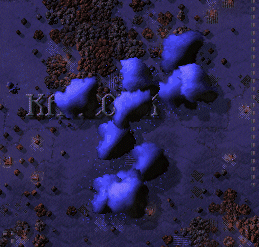Climate: Difference between revisions
No edit summary |
Iamzeroone (talk | contribs) m (Changed instances of "race/races" to "species" and updated links.) |
||
| (3 intermediate revisions by 2 users not shown) | |||
| Line 1: | Line 1: | ||
[[File:weather_both_anim.gif|thumb|161px|right|Both rain and snow.]]'''Climates''' are the average weather conditions in different areas in the [[world]] of ''[[Songs of Syx]]''. These conditions include temperature, humidity, atmospheric pressure, wind, and precipitation. However, temperate and precipitation are the most common factors seen in the game. When starting a new game, the player will be tasked with choosing a capital for their [[settlement]], which involves monitoring the climate of where the player chooses. | [[File:weather_both_anim.gif|thumb|161px|right|Both rain and snow.]]'''Climates''' are the average weather conditions in different areas in the [[world]] of ''[[Songs of Syx]]''. These conditions include temperature, humidity, atmospheric pressure, wind, and precipitation. However, temperate and precipitation are the most common factors seen in the game. When starting a new game, the player will be tasked with choosing a capital for their [[settlement]], which involves monitoring the climate of where the player chooses. | ||
Different | Different [[species]] of [[citizens]] have preferences for specific climates. The frequency of [[immigration|immigrants]] from certain species are dictated by the climate of your settlement. A warmer climate will bring in more [[Cretonians]], while colder climates will bring in [[Dondorians]]. [[Cantors]] don't seem to have a specific weather preference. [[Garthimis]] thrive in temperate and warm areas. [[Humans]] and [[Tilapis]] are the most temperature-versatile species in the game, as they can handle all three climate types, with temperate being the best for them. | ||
[[Agriculture]] is also influenced by the temperature of the region. Both livestock and crops will either benefit or suffer from the temperature in your city (usually suffer). Most produce will have climate where they do considerably better, so it is best to keep this in mind when choosing a location to place your city. | |||
==Temperature== | ==Temperature== | ||
{{imagefix|[[File: | {{imagefix|[[File:temp_preview.png|left]]}}Temperature plays a large part in the game, and if the player is not careful, it will claim the lives of [[citizens]]. To avoid extreme temperatures, a player can choose a "temperate" climate, although days of extreme temperatures can still occur, though it will not be as often as if you chose a "cold" or "warm" climate before starting the game. | ||
Precipitation is also obviously affected by temperature, with either rain or snow randomly occurring. Building a [[hearth]] can help citizens get through cold days, as well as provide happiness. [[Clothes|Clothing]] can provide protection from all types of weather. Skinny dipping can help citizens get through hot days. When viewing [[region]]s in the world view, storm clouds can be seen hovering over the lands. This can be useful for predicting upcoming storms. | Precipitation is also obviously affected by temperature, with either rain or snow randomly occurring. Building a [[hearth]] can help citizens get through cold days, as well as provide happiness. [[Clothes|Clothing]] can provide protection from all types of weather. Skinny dipping can help citizens get through hot days. When viewing [[region]]s in the world view, storm clouds can be seen hovering over the lands. This can be useful for predicting upcoming storms. | ||
| Line 15: | Line 17: | ||
[[Category:Gameplay_elements]] | [[Category:Gameplay_elements]] | ||
[[Category:World]] | [[Category:World]] | ||
[[Category:Articles_with_gallery]] | |||
Latest revision as of 20:40, 16 September 2023

Climates are the average weather conditions in different areas in the world of Songs of Syx. These conditions include temperature, humidity, atmospheric pressure, wind, and precipitation. However, temperate and precipitation are the most common factors seen in the game. When starting a new game, the player will be tasked with choosing a capital for their settlement, which involves monitoring the climate of where the player chooses.
Different species of citizens have preferences for specific climates. The frequency of immigrants from certain species are dictated by the climate of your settlement. A warmer climate will bring in more Cretonians, while colder climates will bring in Dondorians. Cantors don't seem to have a specific weather preference. Garthimis thrive in temperate and warm areas. Humans and Tilapis are the most temperature-versatile species in the game, as they can handle all three climate types, with temperate being the best for them.
Agriculture is also influenced by the temperature of the region. Both livestock and crops will either benefit or suffer from the temperature in your city (usually suffer). Most produce will have climate where they do considerably better, so it is best to keep this in mind when choosing a location to place your city.
Temperature
Temperature plays a large part in the game, and if the player is not careful, it will claim the lives of citizens. To avoid extreme temperatures, a player can choose a "temperate" climate, although days of extreme temperatures can still occur, though it will not be as often as if you chose a "cold" or "warm" climate before starting the game.
Precipitation is also obviously affected by temperature, with either rain or snow randomly occurring. Building a hearth can help citizens get through cold days, as well as provide happiness. Clothing can provide protection from all types of weather. Skinny dipping can help citizens get through hot days. When viewing regions in the world view, storm clouds can be seen hovering over the lands. This can be useful for predicting upcoming storms.
Gallery
-
Clouds seen moving in the world view.

